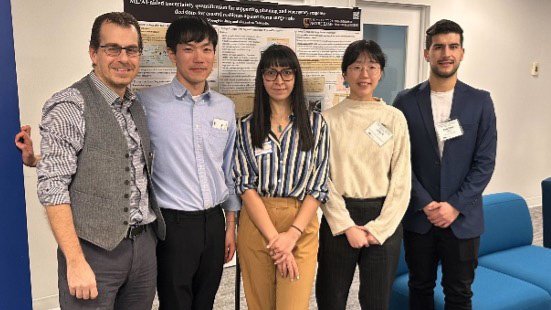SimCenter researchers participated in the workshop “UQ and Trustworthy AI Algorithms for Complex Systems and Social Good”, on March 3-7, 2025, at the University of Chicago. Hosted by the Institute for Mathematical and Statistical Innovation (IMSI), the workshop offered an overview, tutorials, and perspectives on uncertainty quantification and trustworthy AI algorithms that are specifically designed for complex systems and social good.
 Researchers at IMSI workshop (L to R): Alexandros Taflanidis (SimCenter), Woonghee Jung, Parisa Toofani Movaghar, Sang-ri Yi (SimCenter), Esteban Amaya.
Researchers at IMSI workshop (L to R): Alexandros Taflanidis (SimCenter), Woonghee Jung, Parisa Toofani Movaghar, Sang-ri Yi (SimCenter), Esteban Amaya.Professor Alexandros Taflanidis, SimCenter domain expert and Professor of Civil and Environmental Engineering and Earth Sciences at the University of Notre Dame, delivered a plenary talk on “Leveraging machine learning techniques to support planning and emergency response management for storm surge risk,” and he participated as a panelist in the discussion session “UQ for a sustainable future.”
Dr. Sang-ri Yi, SimCenter senior software developer and Assistant Project Scientist at UC Berkeley, presented “ML/AI for Advancing Natural Hazards Engineering: The SimCenter Paradigm,” during a lightning talk and poster session. The presentation highlighted how advancements in ML/AI are crucial to SimCenter’s mission of enhancing society’s resilience to natural hazards.
Two key innovations featured were: 1) a newly developed stochastic emulation approach that enables efficient seismic risk assessment, and 2) surrogate-aided Bayesian calibration technique for computationally expensive simulation models. The stochastic emulation algorithm is available in SimCenter research application tools quoFEM and EE-UQ, while the surrogate-aided Bayesian calibration approach will be highlighted in an upcoming example using quoFEM.